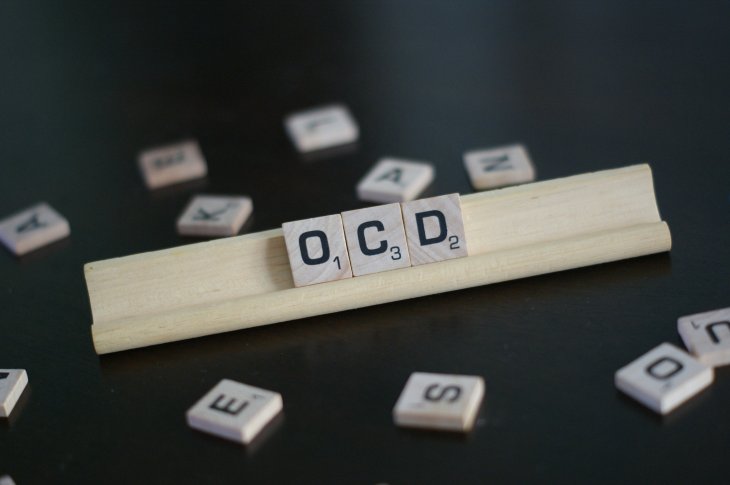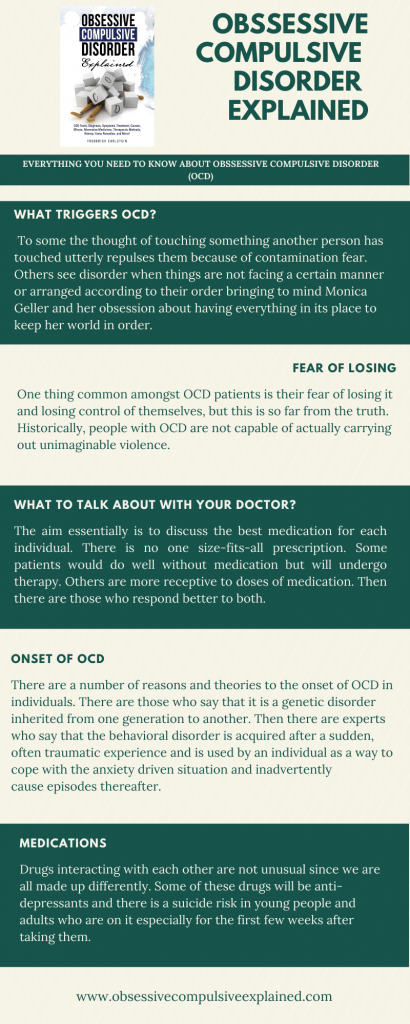What you need to know about OCD? An individual with OCD may show more telling signs when they obsess about cleanliness and hygiene. What, to others, are natural and normal things required of them to do to go about their day, an OCD patient may find repulsive and repugnant. What you need to know about OCD? For some patients the mere thought of opening a door appalls them to their core that they would wait until someone else came along to do it. What you need to know about OCD? The fear of catching or get infected by a virus to them is a deep seated fear which they cannot help and some would try to find ways to cope with their OCD in their own ways – ways that are somehow strange to those around them.
What Triggers OCD?

What you need to know about OCD? To some the thought of touching something another person has touched utterly repulses them because of contamination fear. Others see disorder when things are not facing a certain manner or arranged according to their order bringing to mind Monica Geller; and her obsession about having everything in its place to keep her world in order.
People with OCD may attempt to stop these obsessions but it just heightens their anxiety and distress driving them to carry out acts of compulsion to ease out their stress; and smooth the kinks often centering on themes privy to them or to select people closest to them. One thing common amongst OCD patients is their fear of losing it and losing control of themselves; but this is so far from the truth. Historically, people with OCD are not capable of actually carrying out unimaginable violence.
There are a number of reasons and theories to the onset of OCD in individuals. There are those who say that it is a genetic disorder inherited from one generation to another.

OCD Signs and Symptoms
What you need to know about OCD? Compulsions are ritualistic actions a patient performs in order to curb these mental disturbances which make them seem to go unhinged to the trained eye. It is often times visible clues that would suggest a person to have OCD. When the OCD patient internalizes these patterns of unreasonable thoughts are times when it is not as easy to detect the cues.
Perhaps noticeable through actions unnecessary, to what we would consider as the usual method of order; some patients would exhibit excessive obsession in the “little” things. Take for example cleanliness. They may take time brushing one tooth at a time; paying close mind to the number of cleaning brush strokes, displaying worry about their dental hygiene. Others may display symptoms through cleaning sprees, making sure that each nook and cranny of a space is dusted; wiped down, cleaned and disinfected. Others may need things in a certain order or pattern before they are able to do anything else. Like let’s say, a child who needs to do their homework would first need to have everything around her in order; and in its proper place. This may give her the balance she needs to start focusing on the first needful task properly.

Are You Obsessive Compulsive?
What you need to know about OCD? Patients of OCD have been known to wash their hands repeatedly or compulsively use hand sanitizers which they carry around with them at all times, everywhere. Others have been observed to wear gloves and a face mask for fear of getting infected with germs; perhaps by people they may come in close contact or from the environment in which they need to move about. They are afraid to touch things or people with their bare hands and all of that can become quite overwhelming for them; as it becomes frustrating for those around them.
Perfection is A MUST

Some need perfect symmetry in everything around them that they go around fixing things that they feel are off kilter; out of place or balance, tilted or crooked. There are patients who would line up their clothes in their dressers according the shades and hues of the textile. In others, the disorder is exhibited in the patient as unwanted thoughts; disturbing yet fleeting images of doing or causing harm on themselves or someone else. Others would feel compelled to count repeatedly; then there are those who would check, recheck and go back to check that they have locked all their windows and doors.
Those with ritualistic behaviors find no pleasure in the actions they carry out but in their minds these are necessary things to do in order to get their world in order. They find fleeting relief in the comforting, assuring, ritualistic actions they carry out. People who have a hard time controlling their train of thought is asymptomatic of the behavioral disorder.
What Makes You Tick?
There are those who display the disorder as motor tics through vocal tics like throat clearing, snort, grunts, sniffing, coughing. These are sudden, jerky movements, eye blinking or fast eye movements, they repeatedly shrug their shoulders; grimace, shake or nod their heads.
People with OCD, whether they know it or not; may attempt “to cure” themselves by not getting into situations which they recognize as triggers. Others use drugs to calm themselves and then there are those who resort to the bottle. Almost all adults with OCD recognize the fact that the things they do don’t make sense. In children it would usually be the parents or the child’s teachers; who would recognize the manifestation of symptoms of disorder in the child.
OCD can prevent a person from functioning normally in the world; so it is very important recognize not only the symptoms but also when to get help and see a specialist. OCD can rob someone of the quality of life many of us take for granted. There are available tests to determine if a person has OCD. There is available medication; and therapy which a person or a family member can look into to get help from experts.
When to See a Doctor
There are mild forms of OCD that can be managed through specific methods aided or not by medication; and allow an individual suffering from it live a close to normal life. Others are moderate forms to severe cases of OCD that make it difficult for the individual to function properly because of the consumption of time it takes them to ease and calm themselves; pretty much disabling themselves from performing everyday tasks.
If a person shows signs of worsening OC behavioral disorder; it is time to look for a specialist if you haven’t got one already. Some mild cases seem to disappear in its own and the patient is able to manage their lives. Once your quality of life is affected; like not being able to show up for work on time because of the many rituals you need to perform before even starting your day; it is time to get help.
Not only can this be disabling to you but also the people around you. Some OCD patients especially those who are younger and have limited capacity for vocabulary; and explaining the way they feel; are especially concerning because it causes anxiety to parents when there is in fact several ways of managing the disorder. Performance like the act of getting out of the house can become a chore in itself to a person with OCD; as they make sure that everything that needs to be switched off; or turned off. It’s one thing when a person does this on a frazzling day just to make sure that everything is on the up and up. It is quite a different thing when the time consuming, repetitive actions get in the way of the person’s life.
It seems that there is a stronger likelihood for children of adults with OCD to have them as well. The simple actions and routine of life becomes taxing and demanding; making it difficult for the patient to live life to its fullest.
Treatments
There is definitely help out there for those who are seeking confirmation of condition and who want to be able to manage the disorder. Being one of the more common behavioral disorders found in about 1 of 50 people; you can be sure that you are not alone. Having been able to identify a chemical imbalance of serotonin has allowed medical experts come up with medication that can help balance out the lack of this chemical in an OCD patient.
Psychotherapy
Knowing what you are going through and that you are not alone is an empowering feeling of being to take some control over the disorder. It may make you feel embarrassed at first or defensive about your condition but it is important to get the help you need and map out a treatment plan. Consider joining a support group who face the same challenges; it is important for you to know that the struggle is real and you don’t have to go at it on your own. Some conditions are more severe than others and hence it is advisable to know where to get long-term group care in order to cope better.
Stay goal oriented and never lose sight of your recovery goals. Keep in mind that overcoming OCD is a goal to be made one day at a time. It is an ongoing process for some of the more moderate to severe cases.
Psychosurgery
There are severe cases when patients do not respond to behavioral therapy or medications to alleviate OCD symptoms and psychosurgery are used. There are four kinds of brain surgery that have been proven effective in the treatment of OCD according to the International OCD Foundation.
Anterior cingulotomy involves drilling a hole into the skull then burning an area of the brain known as the anterior cingulate cortex using a heated probe. This is the first form of psychosurgery which has given and shown positive benefits to 50% of OCD patients who initially displayed resistance to medical and therapy treatments.
The gamma knife is the third sort of psychosurgery to treat OCD and does not require cracking open a patient’s skull. A single dose of gamma ray will not make a dent of difference in harming brain matter. However this changes drastically when an intersection of multiple sources of gamma ray converge. When this happens, this creates energy that is enough to kill a target area of the brain. This procedure using gamma knife rays has given relief to about 60 percent of OCD patients who have shown resistance to treatments.
And lastly, available as well and something to discuss with your doctor is the deep brain stimulation (DBS). This is a procedure which requires operating and opening the patient’s skull but does not entail the destruction of brain tissue.
How You Can Help Patients with OCD
Not only should you learn more about OCD, the person with OCD should be able to know more about the behavioral disorder as well. There are many educational materials out there about OCD that give extensive, in – depth information about the illness. Look for informative reading materials which give practical tips aimed to help family members of those living with OCD learn to cope.
A calm support group is essential to the wellbeing and the positive results of treatment for a person with OCD. The support of a loving family can fast track the improved outcome of a treatment for an individual with OCD; whilst criticism, negative comments and snarky remarks could just worsen the situation as well as the symptoms. The best way to help is to approach the OCD behavior and patient with kindness. Simply telling a person with OCD to stop doing what they do when the compulsive behavior could make the person just feel worse because they are not able to follow.
Focus instead on the strengths of the person; and praise all successful attempts of the person who resist their OCD responses. Make sure that you not expect too much that you push a person too hard; or too little that you allow the person to relapse. A good thing to keep in mind is that no one hates OCD more than the person who has it themselves.


 I love to write medical education books. My books are written for everyone in an easy to read and understandable style.
I love to write medical education books. My books are written for everyone in an easy to read and understandable style.